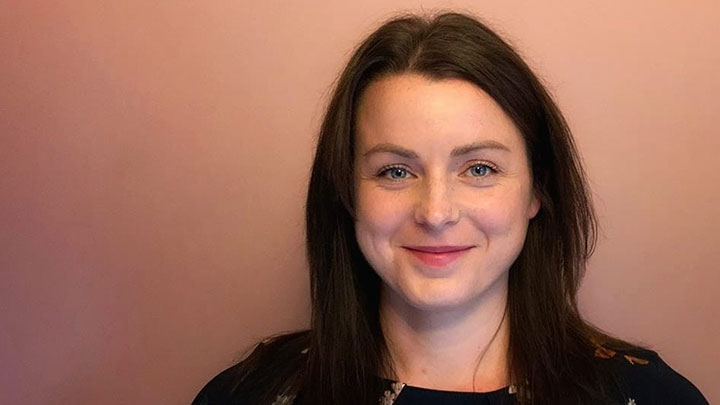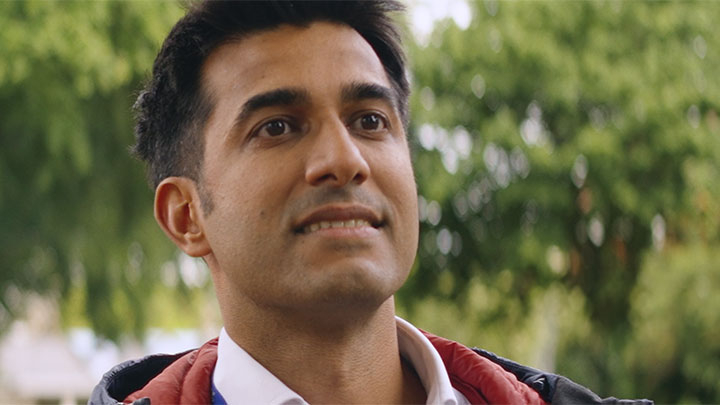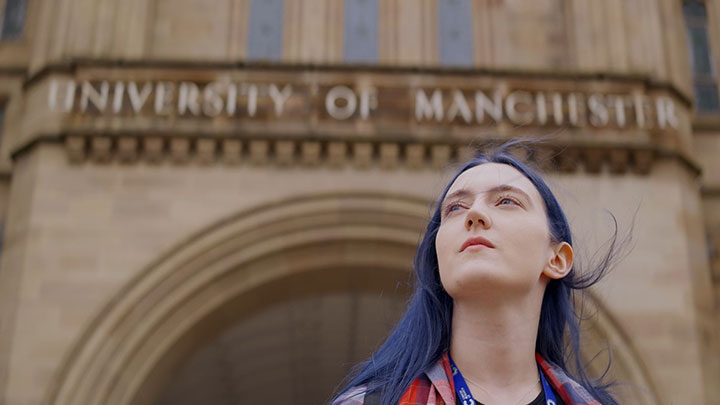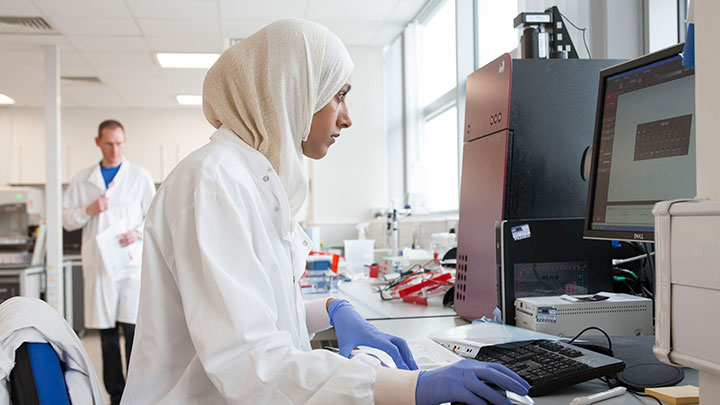Cancer-focused clinical, allied health professional and non-clinical PhD training opportunities.
The CRUK Manchester Centre manages a number of cancer-focused clinical, allied health professional and non-clinical PhD training opportunities in a multidisciplinary team science environment.
These provide an exceptional opportunity for postgraduate researchers to develop a career in world-leading cancer research.
The Cancer Research UK (CRUK) Manchester Centre
Established in 2013, the Cancer Research UK (CRUK) Manchester Centre is a translational research centre uniting basic, translational and clinical research to deliver cancer precision for all.
Research is prioritised across six distinct research themes over key disease sites. The CRUK Manchester Centre is directed by Professor Robert Bristow.
Why apply?
You will benefit from a vibrant research environment.
The research environment includes:
- state-of-the-art facilities for cancer researchers and clinical trials support staff;
- collaborations that provide a seamless link between basic, translational and clinical research to take findings from the laboratory to the clinic;
- generous stipends/salaries (role-specific) and funding for your university tuition fees and running expenses;
- an intellectually challenging, innovative and supportive environment;
- a diverse and in-depth training programme in transferable skills leading to excellent career opportunities.
CRUK Manchester Centre postgraduate researchers are welcomed into a world-leading cancer sciences research environment at the Manchester Cancer Research Centre (MCRC), a unique partnership founded in 2006 by The University of Manchester, Cancer Research UK and The Christie NHS Foundation Trust.
Since its creation, the MCRC partnership has since expanded to encompass cancer research activities across Manchester, driving a consistent, compatible and integrated cancer research strategy with the ultimate aim of creating a future free from the burden of cancer.
The CRUK Manchester Centre and MCRC share a Training Office, which is your designated contact for applications to this scheme.
Cancer Research UK Black Leaders in Cancer PhD Scholarship programme
We are pleased to be part of Cancer Research UK’s Black Leaders in Cancer Scholarship Programme, which is run in collaboration with Black in Cancer and the Windsor Fellowship. This fully funded programme covers project running costs, university tuition fees and a contribution to living costs.
Projects for 2026 entry covering a range of disciplines and specialisms launch in Spring 2026.
Hear from our postgraduate researchers
Helen Clarke
Learn more about Helen's background and her research as a Clinical Research Training Fellow.

Melville Nyatondo
Discover more about non-clinical PhD student Melville’s journey, from taking part in a Black in Cancer (BiC) Mentorship Programme to her plans after her PhD.

Anu Datta
Discover what a day in the life of a Clinical Research Training Fellow in cancer research involves with Anu.

Melanie Seaton
Get a glimpse into a day in the life of Melanie, a non-clinical postgraduate researcher in cancer research.

More trainee stories
You can find out more about our current trainees in our MCRC-CRUK Manchester Centre training and education newsletter (PDF) and on our Researcher Stories page.

Projects
Discover a project you're passionate about
Please note:
- The list has been filtered to projects suitable for the CRUK Manchester Centre PhD training scheme.
- Search for specific projects by adding keywords or supervisor name.
- Do not remove "MCRC" from the search box.
- Removing "MCRC" from this box will return all projects from across the University that meet your search criteria (both funded and self-funded).
- Add additional search criteria afterwards - for example, "MCRC cancer immunology".
How to apply
Apply to the CRUK Manchester Centre PhD Training Scheme.
Applications are closed for 2026/27 entry
If you wish to be considered for our CRUK Manchester Centre PhD Training Scheme and meet our eligibility criteria, you should complete a single online application using the instructions below.
Key dates
- Applications open: Monday, 6 October 2025
- Projects live: Monday, 6 October 2025
- Application deadline: Monday, 17 November 2025
- Interview date: Week commencing 12 January 2026
- Start date: September 2026
Check your eligibility based on which pathway you would like to apply for:
1. Clinical research training fellowships
These fellowships are usually three years in length, but may be four years in exceptional circumstances.
Funding is available for three years full-time, or pro rata for part-time study. Part-time awards cannot be less than 50% of full-time. For visa requirements, international candidates must select the full-time study option.
The fellowship covers:
- running costs;
- university tuition fees (at the UK rate);
- an appropriate salary in line with the candidate's current salary.
All applicants must be post-registration clinicians and ideally have a specialist training post. It is generally expected that CRTFs would return to a training programme in the UK upon completion of their research degree.
2. Non-clinical studentships
These studentships are four years in length and are aimed at applicants who are recent graduates or final year undergraduates.
Funding is available for four years full-time, or pro rata for part-time study. Part-time awards cannot be less than 50% of full-time. For visa requirements, international candidates must select the full-time study option.
The studentships will cover:
- running costs;
- university tuition fees (at the UK rate);
- an annual stipend (£21,000).
Candidates must hold, or be about to obtain, a minimum upper second class undergraduate degree, or the equivalent qualifications gained outside the UK, in a relevant subject. A related master's degree would be an advantage.
International applicant eligibility requirements
The University of Manchester aims to support the most outstanding applicants from outside the UK.
Funding for our CRUK programmes will cover UK tuition fees and stipend only, but a limited number of scholarships will be offered to enable full studentships/Fellowships to be awarded to international applicants.
These full studentships/Fellowships for international applicants applying via The University of Manchester will only be awarded to exceptional quality applicants, due to the competitive nature of this scheme.
These are available for Leeds-Manchester CRTFs only where the lead supervisor is a Manchester staff member.
Decide on the project that is most relevant to your research interests from the list of available projects. Applicants can only apply for one project.
Supervisor contact details are included in the project summary and you are strongly encouraged to contact the supervisor ahead of or during your application.
Invitations to our interview days are dictated by supervisor nominations, so you are unlikely to be nominated by a supervisor unless you have made contact with them, in addition to submitting an online application.
If successful in the shortlisting process, you will be notified before Christmas and invited to interview in January.
To apply, ensure you have read all of our instructions carefully and register for an account, if you haven't already done so, before visiting our online postgraduate application form.
You can make separate applications under your account for any studentships you're interested in.
Create a new application for the studentship. Select 'Postgraduate Research' as the 'Level of Study' on the application form. Under Academic Programme, search for and select 'MCRC PhD Programme'.
Work your way through the application form, including all details as requested.
For Section 6 – 'Research Details', you must state the name of the project supervisor and project title in the format below. Applicants can only apply for one project.
- Name of Supervisor – Project Title
For Section 9 – Funding Sources, you must select the details as follows:
- Select 'Yes' from the drop-down.
- Type of Funding: 'Uni of Manchester scheme'.
- Awarding Body: MCRC PhD Studentship.
- Status of Funding – Awarded.
- Funding Covers – Fully Funded.
- Leave the remaining boxes blank.
Your application form must be accompanied by a number of supporting documents.
- Curriculum Vitae (CV)
CV scoring forms part of our PhD interview process and will be conducted by panellists ahead of our interview. For guidance on how to write your CV, please visit the CRUK Manchester Centre Non-Clinical or Clinical webpage.
- Supporting statement
A personal statement (1,000 words maximum) indicating your first choice project. Please also comment on your suitability for the post, giving an overview of your relevant experience and training.
- References
We require two references from people who have knowledge of your academic ability. These are usually academic references from a lecturer or professor at your previous university.
You will need to provide details of your referees in section 10 of the online form. Your referees will be contacted directly after you submit your application and directed to complete our online reference form.
Email addresses
It is recommended that the email address you provide for your referees is related to the academic institution or organisation to which they belong, rather than a personal use email (for example, john.smith@yahoo.com).
If a personal email address is provided, it may cause delays to your application, as extra steps may be required to verify this.
- Certificates and transcripts
These should be from all of your previous degrees, including official translated copies where applicable.
- Official English Language certificate
This should be a valid English language qualification, where applicable. See Step 6 below for further details.
Please note, your application must be complete and contain all required supporting information at the time of submission, as incomplete applications will not be considered.
In Section 5 of the online application form, you will be asked to provide details of how you meet the English Language requirement.
We mainly accept IELTS or TOEFL tests. Please note IELTS and TOEFL are only valid for two years.
We require a minimum IELTS score of 6.5 overall or TOEFL (iBT) 90. Each component of the English test should meet the minimum requirement of IELTS 5.5 in all components, TOEFL (iBT 22). For the writing component, we expect you to have achieved a minimum of 6.0 (IELTS).
If your IELTS or TOEFL expires before the start of your programme, you will need to take another official English test before we can issue you with a CAS for your visa application. This is a requirement of UKVI.
The University accepts a number of English language tests. For more information, see: English language requirements.
Once submitted, you will receive acknowledgement that your application has been received.
After we have received all your supporting documents, your application will be reviewed and circulated to your preferred supervisor(s).
Formal interviews will be conducted by our interview panel (exact dates/times will be confirmed by email if you are selected) and will consist of:
- a paper critique by the applicant;
- a discussion with the panel;
- a question and answer session with the panel.
Prior to the interview day, a full itinerary will be sent to you confirming further details about the process including information about additional activities that may take place on the day, as well as practical information on getting to the interview location. Virtual attendance will be offered.
Please ensure that you provide full contact details in your CV including an up-to-date email address and telephone number (preferably a mobile number) for correspondence.
If you have any queries about the interview, please contact MCRCtraining@manchester.ac.uk.
If you are not nominated by a supervisor for a panel interview, then we will notify you directly that your application is unsuccessful.
Interviews for 2024 entry were held in Manchester on Friday 12 January 2024.
Contact us
Have any questions? Get in touch.
For queries regarding the application process, the projects on offer or your eligibility, please contact the Doctoral Academy.
Email: fbmh.doctoralacademy.admissions@manchester.ac.uk
Tel: +44 (0)161 275 5608
You may wish to contact supervisors directly about projects.
